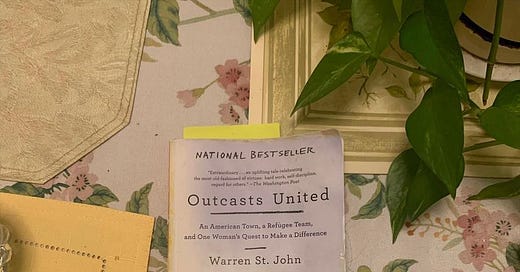This book was loaned to me by my lovely friend Cassie who told me it was an absolutely beautiful read, and she was right! The book centers around Clarkston, Georgia, a refugee settlement center, where the older (whiter) population of the town was forced to adapt to a stream of refugee newcomers.
In the midst of Clarkston’s tension, a woman named Luma Mufleh created a youth soccer league for the young, displaced refugees, called the Fugees. This true story chronicles how the team shaped the lives of its players and Luma herself over a compelling backdrop about the lives of the players’ families prior to resettlement.
As someone with little knowledge of soccer or the resettlement process, I found this book fascinating and incredibly inspiring. The fact that I was deeply moved by a book about two things I’m unfamiliar with is the mark of good writing and great journalism.
St. Warren set up the many characters and complicated plot in a clear way that was easy to understand. I can count on one hand the amount of times I was confused by soccer jargon, and that is a miracle considering that I stopped playing in the second grade.
I gained a better understanding of “liminality,” and how feeling caught between worlds colors refugee life. St. Warren clearly demonstrated that the experiences had by refugees in resettlement communities are not monolithic, and told the complex stories of many families.
Structurally, the book switched between pivotal moments of the soccer season, landmarks in the players’ lives, and rich historical backstories. The transitions were clean and the book remained engaging throughout all 300 pages.
The message of the book overall is summed up in the epilogue, where Tracy Ediger talks about the idea that Luma is not a hero, but instead an average person doing her best. It ends with a call to action that all of us, heroes or not, should do what we can to better our communities.
Outcasts United is exactly the type of book I hope to write someday. After dipping my toe in the journalism world this semester, I had no idea that a book of this magnitude could be so reporting-focused.
Last winter, I read The Mastermind by Evan Ratliff and loved it, but I didn’t realize that literary journalism was a genre all to itself. I’ll definitely be picking up more books in that style, so please give me recommendations!




Some literary journalism I've loved: How the Word Is Passed by Clint Smith and Empire of Pain by Patrick Radden Keefe. Two on my list: Bad City by Paul Pringle and Invisible Child by Andrea Elliot.